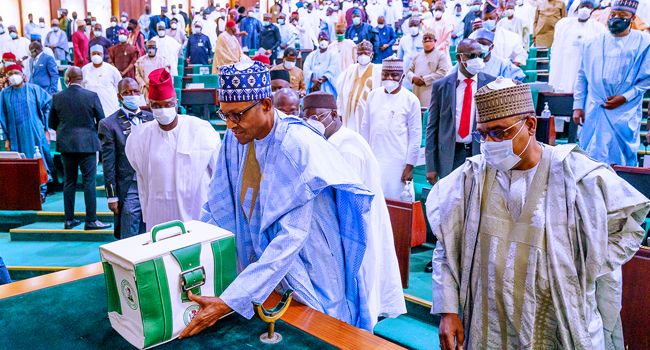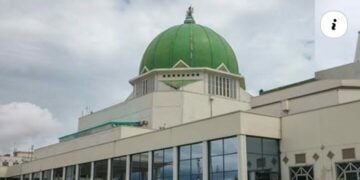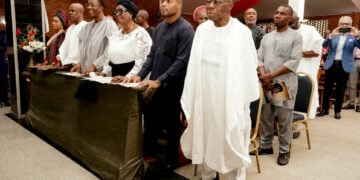President Muhammadu Buhari yesterday presented the 2023 Appropriation Bill to a joint session of the National Assembly.
The document tagged, “Budget of Fiscal Stability and Transition” reflected a total budget of N20.51 trillion which represents about N750 billion increase from the N19.76 trillion projected in the 2023-2025 Medium Term Expenditure Framework and Fiscal Strategy Paper already passed by both chambers of the National Assembly.
Out of the N20.15 trillion, N8.27 trillion was proposed as non-debt recurrent costs, N6.31 trillion earmarked for debt servicing, N5.35 trillion for capital expenditure (including the capital component of statutory transfers) while N4.99 trillion was earmarked for personnel costs.
A total of N1.11 trillion was recorded as overheads, N854.8 billion as pensions, gratuities and retirees’ benefits and N744.11 billion as statutory transfers. A sinking fund of N247.73 billion was earmarked to retire certain maturing bonds.
President Buhari while presenting the budget estimate for the last time in an annual ceremony which lasted for about 90 minutes, noted that the expenditure policy of the government in the year 2023 was designed to achieve the strategic objectives of the National Development Plan 2021 to 2025.
This, according to the president include macroeconomic stability; human development; food security; improved business environment; energy sufficiency; improving transport infrastructure; and promoting industrialisation focusing on Small and Medium Scale Enterprises.
The president warned members of the National Assembly against insertions into the budget proposal, noting that it should be passed in its organic form.
He also warned relevant committees of the National Assembly to desist from passing budgets for Government Owned Enterprises (GOEs) which are at variance with the budgets sanctioned by him and communicate same directly to the MDAs. This according to the president is against the rules and must stop.
“I have directed the minister of finance, budget and national planning to immediately work on mainstreaming these reforms and work with the National Assembly on passing an organic budget law which I hope to assent to before the end of this administration.
“I would like to implore the leadership of the National Assembly to ensure that the budget I lay here today, which includes those of the GOEs, be returned to the presidency when passed. The current practice where some committees of the National Assembly purport to pass budgets for GOEs, which are at variance with the budgets sanctioned by me, and communicate such directly to the MDAs is against the rules and needs to stop,” he stated.
While reeling-out the budget parameters and fiscal assumption in the estimate, the president said the oil price benchmark of $70 per barrel at a daily oil production estimate of 1.69 million barrels (inclusive of condensates of 300,000 to 400,000 barrels per day). The exchange rate of N435.57 per US dollar and projected GDP growth rate of 3.75 percent and 17.16 percent inflation rate.
The estimated federally-collectible revenue is estimated at N16.87 trillion, while the federally distributable revenue is estimated at N11.09 trillion. The document, however, indicated that the total revenue available to fund the 2023 federal budget is estimated at N9.73 trillion, which includes the revenues of 63 government-owned enterprises.
The total oil revenue is projected at N1.92 trillion; non-oil taxes are estimated at N2.43 trillion while independent revenues are projected to be N2.21 trillion. Other revenues, according to the budget estimates stand at a total N762 billion while the retained revenues of the GOEs amount to N2.42 trillion.
President Buhari who expressed worry about the skyrocketing price of food items in the country said various measures were being implemented to address the underlying factors.
“Government is very concerned about the high food prices in the country. Various measures are being implemented to address structural factors underlying the issue. We will also step-up current efforts aimed at boosting food production and distribution in the country. You will recall our efforts in improving production of fertilizer, rice, maize cassava among other earlier initiatives,” he stated.
While explaining how the government intends to fund the N10.78 trillion reflected in the budget estimate, the president said his administration planned to finance the deficit mainly by new borrowings totaling N8.80 trillion N206.18 billion from privatisation proceeds and N1.77 trillion drawdowns on bilateral/multilateral loans secured for specific development projects/programmes.
“We expect total fiscal operations of the federal government to result in a deficit of N10.78 trillion. This represents 4.78 per cent of estimated GDP, above the 3 per cent threshold set by the Fiscal Responsibility Act 2007.
“As envisaged by the law, we need to exceed this threshold considering the need to continue to tackle the existential security challenges facing the country.
“Over time, we have resorted to borrowing to finance our fiscal gaps. We have been using loans to finance critical development projects and programmes aimed at further improving our economic environment and enhance the delivery of public services to our people,” the President said.
President Buhari said recovery from each of the two recessions already witnessed during the life of his administration would not have been as fast without the sustained government expenditure funded by debt.
“As you are aware, we have witnessed two economic recessions within the period of this Administration. A direct result of this is the significant decline in our revenue generating capacity.
“In both cases, we had to spend our way out of recession, resulting in higher public debt and debt service. It is unlikely that our recovery from each of the two recessions would have been as fast without the sustained government expenditure funded by debt,” he added.
Meanwhile, president of the senate, Ahmad Lawan and speaker of the House of Representatives, Femi Gbajabiamila, have advocated an increase in government revenue and stricter handling of oil thieves considering the socio-economic damage they are foisting on Nigerians.
Lawan in his welcome address at the budget presentation urged President Buhari to initiate decisive steps to curtail the massive stealing of the nation’s crude oil.
The president of the senate who put the estimated loss of crude in the first quarter of 2023 at about N790 billion noted that the nation’s OPEC daily quota of 1.8million barrels per day was under serious jeopardy.
“Mr President, our economy is still challenged by dearth of revenues. The main source of revenue for the Nigerian government is oil and gas. We always consider the diversification of the economy as crucial and it’s indeed crucial. The idea of deploying our revenues from the oil and gas to support the diversification into real sectors like agriculture, manufacturing, mining, etc is now under serious threat. The large scale and massive stealing of our oil is concerning, as this reduces drastically the revenues available to the government.
“With conflicting figures, projections have put our losses from this malaise at between 700,000 to 900,000 barrels of crude oil per day, leading to about 29 to 35 per cent loss in oil revenue in the first quarter of 2022. This represents an estimated total fall from N1.1 trillion recorded in the last quarter of 2021 to N790 billion in the first quarter of this year.
“The situation has worsened. Recently, the loss of our oil has reached one million barrels per day. Translated into monetary terms, our loss is monumental. The figures show we are not able to meet the OPEC daily quota of 1.8million barrels per day.
“Mr President, I consider the oil thieves the worst enemies of our country. The thieves have declared war on our country and our people. I strongly feel that if we do not take the necessary measures to stop the thieves immediately, our economy will be devastated, as efforts to provide infrastructure and diversification of the economy would both be thwarted. It is time to take drastic and desperate measures against the thieves.”
“Aside from containment of crude oil theft, the President of the Senate advised the Buhari administration to take more than passing interest in the worrisome budget deficit ” estimated at N7 trillion and the grim prospect of its increase to about N11.30 trillion as presented in the 2023 – 2025 Medium Term Expenditure Framework / Fiscal Strategy Paper (MTEF/FSP),” he said.
Lawan, thereby, urged President Buhari to ensure an increment in federal government revenue by reviewing the waivers and concessions the government has granted to the tune of N6 trillion, noting that some of the waivers could not be justified in the face Of dwindling government revenues.
He further suggested that revenue generating agencies of government should be removed from direct funding placed I’m percentage of cost of collection of revenues.
On his own part, Speaker of the House, Gbajabimila, in his closing remarks during the presentation said the National Assembly was set to exercise the full authority of parliament to hold to account those who fail to provide the records needed to make informed decisions on the Appropriation Bill.
While highlighting the dangers oil theft portends for Nigeria, Gbajabiamila said, “Mr President, permit me to convey the disquiet in the House of Representatives arising from the reports of a massive decline in the volume of crude oil exports due primarily to theft and diversion by criminal elements.
“It is the sense of the House of Representatives that those engaged in these activities are agents of economic sabotage determined to bring our country to its knees.
“Therefore, our position is that their actions constitute treason against our country, for which they and their enablers must be held accountable to the fullest extent permitted by law.
“Nigerians no longer want to hear about crude oil theft. The question has now become what are we doing about it”.
The speaker did not mince words on how to address the issue for the good of all, “Therefore we are urging a swift and systemic overhaul of the systems in place to protect the country’s oil and gas resources.
“Evidently, the arrangements in place are no longer adequate. As such, there is an obvious need for improvements to stop the loss of income occasioned by this ongoing sabotage.
“This is especially so at this time when the conditions of our national finances require significant borrowing to finance government operations, sustain investments in infrastructure and national security and improve the living conditions of the Nigerian people,” he noted.
Gbajabimila also handed down a warning to Ministries, Department and Agencies (MDAs) of government to adhere strictly to laws governing their accounting process as the consideration of the 2023 Budget estimates commences.
The speaker insisted on the need for due diligence and strict adherence to the law by government Ministries, Departments and Agencies(MDAs) on accountability.
The chief executive officer, Centre for the Promotion of Private Enterprise (CPPE), Dr Muda Yusuf, said that the 2023 federal government budget has further amplified the troubling fiscal outlook for the economy, saying expenditure continues to accelerate amid consistent weak revenue performance.
Yusuf explained that “we have a budget of N20.51 trillion and revenue projection of N9.73 trillion. This is a deficit of N10.78 trillion. In all probability, the deficit will be much bigger by year end because of the track record of revenue under performance over the last couple of years.
“We are also likely to see an acceleration of Central Bank of Nigeria (CBN) financing of fiscal deficit given the revenue performance trajectory. The public debt stock is growing and currently at N42 trillion.
“With additional new borrowing of N8.8 trillion, the debt profile will be inching close to N50 trillion by May next year. If we take into account the borrowing from the CBN (ways and means), which is currently about N20 trillion, we will have a total debt of N70 trillion by end of 2023. This should be a cause for concern.”
He noted that a number of issues need to be addressed to achieve the nation’s fiscal sustainability aspiration, saying that government owned enterprises managing huge economic assets need to justify the value of assets at their disposal; and oil revenue performance should be much better given the prevailing global oil price.”
He pointed out that the foreign exchange policy regime is adversely impacting on business environment and needs to be urgently addressed, saying weak private sector performance would naturally affect non-oil tax revenues.
He also said there is a need for budget reforms, adding that the budgetary appropriations must reflect urgent national economic priorities.
“We agree with the President that funding of tertiary education cannot be adequately and sustainably supported exclusively from government budget. New funding models need to be urgently explored for adequacy and sustainable funding. Current budgetary provisions need to be augmented from new innovative funding windows.
“The same is true for road infrastructure financing. The road fund bill needs to be revisited to ensure sustainable funding of road infrastructure across the country. Budget funding for roads cannot guarantee quality road infrastructure for a country over 200 million people,” Yusuf said.





